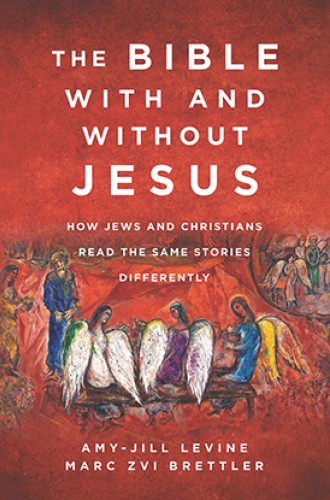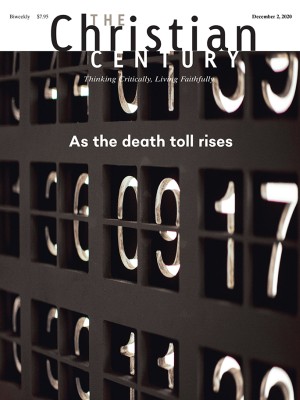The Old Testament, the Tanakh, and the Hebrew Bible
Amy-Jill Levine and Marc Zvi Brettler show how multiple traditions arise when different people read the same text.
Robert Burns’s famous couplet came to mind as I read this book: “O wad some Pow’r the giftie gie us / To see oursels as ithers see us!” In this case, the “Power” is two Jewish scholars, Amy-Jill Levine, who teaches New Testament and Jewish studies at Vanderbilt University, and Marc Zvi Brettler, who teaches Jewish studies at Duke. Together, they examine roughly a dozen biblical passages that the New Testament cites from the Old, employing three lenses: a historical-critical reading in search of the text’s “original meaning,” the appropriation of that text in the New Testament (and often by early Christian writers), and the appropriation of the same text in the early rabbinic tradition (usually ending with the Mishnah but sometimes extending through the Talmud or even medieval commentators).
The authors plainly state their objective: to enlighten both Jews and Christians (but clearly primarily the latter) as to how adherents of the other tradition have both in good faith and within reasonable interpretive boundaries read the same texts in very different ways. Such differences, they aver, should stimulate not polemics but “possibilities” of mutual respect and enlightenment. They are overtly not interested in simply finding commonalities between Christian and Jewish readings (although I found myself intrigued by how often later interpretations overlapped for reasons entirely internal to their respective faith traditions).
Read our latest issue or browse back issues.
Levine and Brettler deal almost immediately with the problem of nomenclature: What shall we call the source collection of texts? Any term in use by one tradition is problematic to the other. In the end, they settle on “Old Testament” when discussing Christian appropriation of the collection, “Tanakh” for Jewish usage, and “Hebrew Bible” when examining the texts in their original context. The latter comes across as their least bad choice, as no faith community employs a body of writings by this name; it’s a term favored by scholars for its supposed neutrality. But it has its own baggage. Indeed, Levine has elsewhere written: “The so-called ‘neutral’ term is actually one of Protestant hegemony.”
Another question that arises at the outset is what place two Jewish scholars have in describing and rendering judgment on Christian interpretations. Although the authors write unapologetically as Jews, I would object strenuously to any attempt to apply a scholarly equivalent of an “identity politics” critique to this work. For one thing, these two have demonstrated their knowledge of and sympathy for the New Testament. They coedited the marvelous The Jewish Annotated New Testament (Oxford University Press). For another, they demonstrate a deep understanding of how the Christian construal of texts and reality has led to a coherent, defensible belief system. In fact, they argue that Christianity is in its essence a belief system, in contrast with Judaism as an ethnicity centered on an ethic. Yet nowhere do they even hint that they would consider “Christian ethics” to be oxymoronic.
After outlining the hermeneutical assumptions of both traditions and elaborating the Christian understanding of prophecy, the authors illustrate how Jews and Christians operate with the “same stories” but “different Bibles.” They discuss a broad selection of texts and themes, including the creation stories in Genesis 1–2, what Christians call “the Fall” in Genesis 3, Melchizedek’s role in Genesis 14 and Psalm 110 (and the interpretation of these texts in the letter to the Hebrews), Jesus’ interpretation of the law in the Sermon on the Mount, sacrifice and the role of blood in atonement, the claim in Matthew 1:23 that the virgin birth of Jesus is “to fulfill” Isaiah 7:14, the suffering servant in Isaiah 52:13–53:12, the “sign of Jonah” cited in Matthew 12:38–40 and Luke 11:29–32, Psalm 22 (and other psalms) vis-à-vis Jesus’ “cry of dereliction” on the cross in Matthew and Mark, and the various references to the “son of man” in Daniel 7:13–14 and in the Gospels.
Levine and Brettler examine each text through their three lenses, although in some cases they give little attention to the rabbinic appropriation. Invariably, they conclude that the historical-critically derived “original meaning” does not lend itself to its later New Testament (or other Christian) usage, absent both hindsight and an a priori decision that the Old Testament scriptures testify to Jesus (as Jesus himself claims they do in Luke 24:27). At the same time, when they do take up rabbinic usage, the authors note that the rabbis also interpret the text according to their own presuppositions, which often manifested as anti-Christian polemic.
This latter point highlights one of the real benefits of this book for Christians. At long last, many Christians seem to grasp that Jesus was truly Jewish. What they often do not realize is that rabbinic Judaism underwent significant development following the Roman destruction of the Second Temple in 70 CE, such that what became Judaism and what became Christianity developed in tandem. It is appropriate to envision Christianity as in some ways the child and in other ways the sibling of Judaism—and in either event for adherents of the one to recognize those of the other as family.
This is not to obviate the reality of great differences between the two. For the most part, the authors fulfill their objective of stressing possibilities rather than polemic. In part, they do this by a fair and accurate, even generous, reading of the Christian interpretive tradition. One of the very few exceptions is their apparent assumption that all Christians accept an Augustinian understanding of original sin as veritably genetic. This is not true of Orthodox Christians, nor of some Protestants.
Levine and Brettler also regularly and civilly cite Christian scholars. A rare exhibition of sharp elbows comes in their suggestion that one scholar is not “doing history” properly in his treatment of Isaiah 7:14 and Matthew 1:23. Their critique seems to suggest that a secular, even positivist approach is required to “do history” by proper, critical standards. But it is not clear to me from the quotation of this particular scholar that he is intending to do history, critical or otherwise, nor why this must be so in a book devoted to enhancing Jewish-Christian mutual understanding.
The book opens with a discourse on Marc Chagall’s painting Abraham and the Three Angels, which is only pictured on the dust jacket. Call this a quibble (and it is), but the location of the image is problematic for users of library copies on which dust covers are not retained. Future printings might consider inserting a color frontispiece across from the preface.
I believe there will be future printings, since this book is so incisive and accessible in content and welcoming in tone. The authors express very well a point I sought to convey throughout my career at Christian colleges and universities: “The more one knows of Israel’s scripture, the more meaningful the New Testament becomes.”
A version of this article appears in the print edition under the title “Same stories, different Bibles.”







